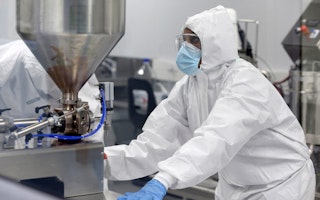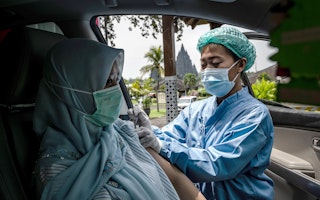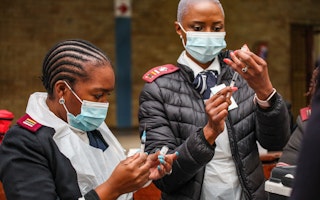
Globally, the COVID-19 pandemic has resulted in 400 million infections and more than five million deaths. While the virus does not discriminate, the crisis has shed light on the stark inequities between the world’s haves and have-nots. While about two-thirds of the world population has received at least one dose of a COVID-19 vaccine, less than 2 in 10 people in low-income countries have received at least one dose.
We must treat COVID-19 diagnostics, treatments, and vaccines as common goods for the benefit of all, not instruments of profit for large companies nor supplies for high-income countries to amass, leaving others without.
Now in the third year of the pandemic, vaccine inequality continues to prolong this health crisis, leading to more deaths and potentially allowing the virus to mutate dangerously in hotspots. The world will not succeed in controlling COVID-19 everywhere until vaccines, as well as diagnostics and treatments, are affordable and widely accessible to all people everywhere. While so much of the attention of the world’s richest countries is now focused on Ukraine, it is vitally important that we do not be distracted from the battle to contain and eradicate this pandemic.
Why do millions in parts of the world remain unvaccinated?
As the vaccines were being developed in 2020, governments across high-income countries made deals directly with pharmaceutical companies and contributed billions of dollars in public funds to support their development, testing, manufacturing, and distribution. In exchange, these countries received guaranteed access to a set number of doses. When vaccines entered the market in early 2021, many of these countries also engaged in vaccine nationalism—stockpiling so many excess doses that millions expired and were discarded before they could be used.
This meant that the rest of the world was at the back of the queue for supplies to vaccinate their own populations. Many low-income countries had to wait for pooled vaccine procurement and distribution mechanisms like COVAX, or rely on the willingness of high-resource countries to redistribute excess doses. This happened even though many lower income countries had cash-in-hand to purchase their own vaccines. For instance, the African Union could not procure the vaccines it wanted even with the $2 billion at its disposal. This inequality has been exacerbated by the fact that Africa imports 99 percent of its vaccines—making it impossible to be self-reliant.
Meanwhile, large pharmaceutical companies have refused to share the vaccine recipe and know-how that would make it possible for other manufacturers to start producing them. The European Union and countries including Germany, France, and the United Kingdom have stood by the interests of the pharmaceutical industry and blocked a proposed World Trade Organization waiver of intellectual property rights for COVID-19 vaccines, an initiative suggested by India and South Africa.
How does this bode for access to diagnostic tests and therapeutics?
The catastrophic global gap in vaccine access risks being repeated when it comes to diagnostics and treatments. Access to a PCR test in countries like Ghana, Kenya, or South Africa can cost half of a teacher’s monthly salary. In Africa alone, six in seven COVID-19 infections go undetected.
High-income countries are also stockpiling new therapeutics. For example, they have already purchased the first 30 million courses of the new oral antiviral treatment Paxlovid, found to reduce hospitalization of high-risk patients by up to 89 percent, and expected to be available in July 2022. This means that this drug is likely to remain out of reach for most people in low- and middle-income countries for at least a year.
What does pandemic justice look like?
The pandemic has shone a spotlight on the failures of the charity-driven global health response that, today, has led to nonexistent or fragile health systems in many low-resource countries and a medicines and health technologies industry that puts many countries at a brutal disadvantage for essentials.
Undoing this means supporting more capacity in the Global South to produce its own vaccines, diagnostics, and therapeutics, and ensuring that scientific breakthroughs anywhere can alleviate public health emergencies everywhere. This can only be done through patent waivers and technology transfer for vaccines and other tools.
Manufacturers in low- and middle-income countries should not only be freed from legal liabilities if they replicate essential vaccines and other tools to fight COVID-19, but also supported with the technology transfer and know-how they need to engage in production. Meanwhile, governments of countries where pharmaceutical giants are based must step up to use all the tools at their disposal to push these corporations to share vaccine technology and know-how.
A solidarity-based response to the pandemic also means that high-income countries should help fund the drive to get vaccines into arms, including supporting the costs of health workers, outreach programs, and public awareness campaigns. Solving the challenges of enough vaccine supply won’t matter if countries don’t have systems in place to turn doses into administered vaccinations. What’s more, high-income countries shouldn’t use the COVID-19 crisis as an excuse to cut foreign aid by, for example, counting the cost of redistributed vaccines—including those which were too close to expiry to be used—toward their overseas development budgets.
In addition, domestic rollouts of vaccines, diagnostics, or therapeutics must be designed and implemented to include marginalized populations. So far, the COVID-19 vaccine rollout highlights how inequities continue to leave the most marginalized populations of the world underprotected, including groups that face discrimination due to race and class, persons in detention, and those who have been forcibly displaced. In-country vaccination programs must include clear protections for such groups, and decision-makers should engage in consultations with civil society to make sure that their response strategies are inclusive, well-designed, and explicitly protect the interests of the most vulnerable.
What is Open Society doing to help improve vaccine access?
The Open Society Foundations have invested more than $240 million to respond to COVID-19. In response to the major health and economic crises generated at the start of the pandemic, and the risk that certain groups would be left out of government programs, in 2020, Open Society made major global investments in safety nets for communities at risk, including immigrant and undocumented families, workers in the informal and gig economies, women, and persons with disabilities. Since then:
- We have supported advocacy to advance vaccine equity and actions to improve access, drawing on the philosophy and ideals reflected in the call for a People’s Vaccine. Open Society has provided funding for partners engaging in global campaigns, including ONE, Oxfam, and the People’s Vaccine Alliance. It also supports numerous NGOs with the deep roots, powerful voice, and local expertise that make social change possible, such as the African Alliance, i-MAK, Focus on the Global South, Third World Network, Development Alternatives with Women for a New Era (DAWN), and others.
- Open Society has also invested in decentralized manufacturing of COVID-related medical technologies. For example, we partnered with the Gates Foundation to launch a new social enterprise to expand access to medical technology.
- The Foundations have funded grassroots, democratic movements around the world to strengthen accountability throughout national pandemic responses, as well as legal advocacy and litigation to protect the health and other human rights of vulnerable and equity-seeking populations.
- Because addressing COVID’s heath and economic crises requires a collective moral voice from philanthropy, we have also played a role in convening leading foundations to catalyze more funding for vaccine equity and a just economic recovery, and to advocate collectively for the bold steps needed to end the pandemic.
Read more
Vaccine Justice
The Quest to Boost Africa’s Fight Against COVID-19

While Africa consumes 25 percent of the world’s vaccines, only one percent of vaccines are manufactured there. The mRNA vaccine manufacturing hub in South Africa is working to change that.
Fighting COVID-19
A $100 Million Booster for Vaccine Equity

As the fight against COVID-19 continues, all countries need access to vaccines, not just the rich ones. Open Society’s $100 million commitment to COVAX will help deploy millions of vaccines to the nations most in need.
Vaccine Justice
Q&A: Africa’s Fight for Vaccine Equity

As the pandemic enters its third year, African Alliance founder Tian Johnson shares reflections on how to make progress in the push for vaccine equity and what African civil society organizations are asking for now.